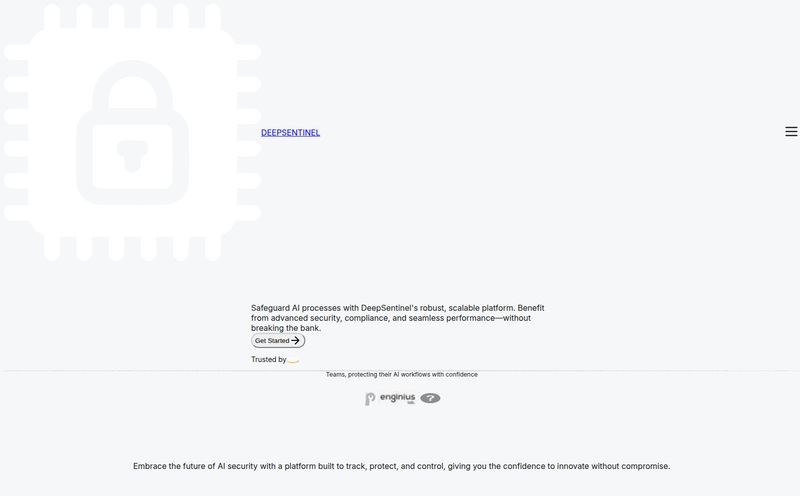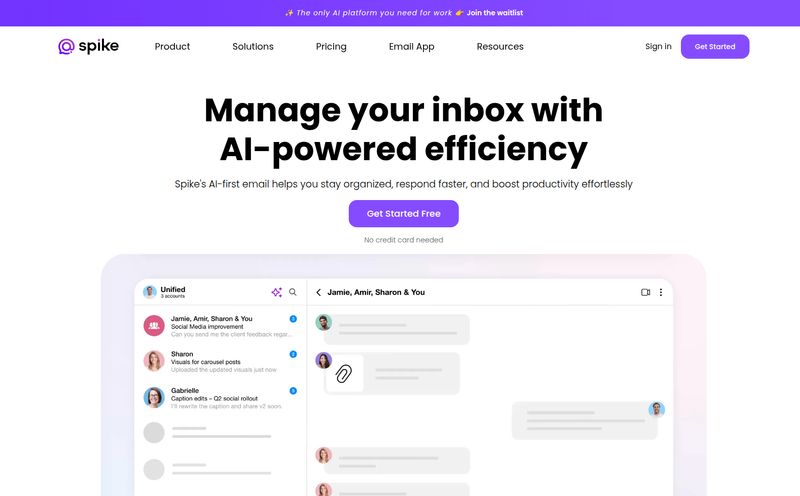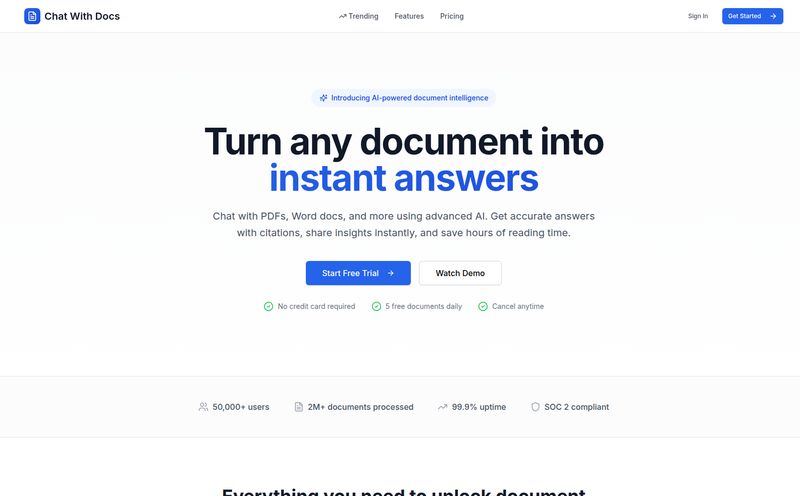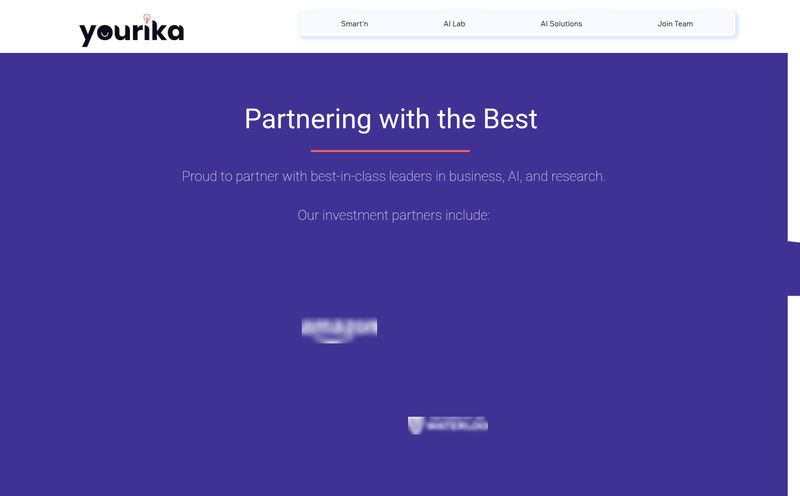Web scraping has always been one of those things that sounds simple in theory but is a massive pain in practice. For years, I’ve seen it as a necessary evil in the world of SEO and market research. It's been the domain of developers hunched over their keyboards, wrestling with complex libraries and constantly updating their scripts every time a website so much as changes a button's color. You either had to be a coder, or you had to hire one.
I’ve spent more nights than I care to admit trying to pull competitor pricing or track brand mentions, only to be thwarted by a sneaky CAPTCHA or a site structure that changes with the wind. It's a grind. So when a tool comes along that promises “No Code. Any Site. For Your Agent,” my seasoned, slightly cynical marketing brain perks up. That tool is BrowserAct, and I've been digging into it.
Is it just another scraper with a slick landing page, or is it actually changing the game? Let’s find out.
What on Earth is BrowserAct?
Okay, so on the surface, BrowserAct is a web scraping tool. But that's like calling a smartphone a device that makes calls. It misses the point entirely. BrowserAct is an AI-powered cloud browser automation platform. The key here isn't the browser part, it's the AI and automation part.
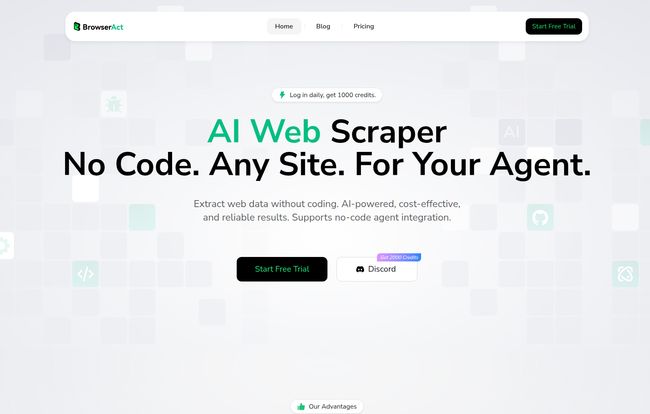
Visit BrowserAct
Instead of writing lines of code to target specific HTML elements (which, again, break all the time), you interact with BrowserAct using natural language. You literally tell it what you want. Think, “Go to this list of competitor websites, find the price and name of every product in the 'sale' category, and put it in a spreadsheet for me.”
It’s less like being a mechanic building the car and more like telling a very smart, very efficient chauffeur where to go and what to bring back. For non-technical folks like marketers, founders, or researchers, this is huge. It democratizes data access. And for the tech crowd, it's about offloading the tedious grunt work to focus on the bigger picture—like what to actually do with all that beautiful, clean data.
The Secret Sauce - What Makes It Tick
A lot of tools promise simplicity. But what I've found is that simplicity often comes at the cost of power. BrowserAct seems to have found a pretty sweet spot, and it comes down to a few core capabilities.
"Just Tell Me What You Want": Natural Language Control
This is the headline feature, and for good reason. The ability to control a complex process with plain English is the dream. It removes the single biggest barrier to entry for web scraping: the code. You’re not just clicking around a clunky UI either; you’re giving instructions. This feels like the first step toward those sci-fi futures where we just talk to our computers. The platform's AI interprets your request and translates it into a series of browser actions. It’s intuitive and, honestly, a little bit magical the first time you see it work.
Bypassing the Internet's Annoying Gatekeepers
Anyone who's ever run a scraper knows the two great evils: geo-blocks and CAPTCHAs. You want to see prices from the UK? “Access Denied.” You try to scrape more than ten pages? “Please prove you’re not a robot by identifying all the bicycles.” It’s infuriating. BrowserAct tackles this with a built-in global residential IP network. This makes your requests look like they're coming from a regular user in Germany, India, or wherever, neatly stepping around most geo-restrictions. Plus, its automated verification bypass system is designed to handle those pesky CAPTCHAs and other login challenges. This isn't just a convenience; it's a necessity for reliable, large-scale data extraction.
Clean Data, No Fluff, No Interruptions
Another small but mighty feature is the automated ad blocking. When you’re pulling data, the last thing you want is for your process to be derailed by a pop-up or for your dataset to be cluttered with irrelevant ad content. BrowserAct runs clean, ensuring the data you get is the data you actually asked for, without the noise. It’s a quality-of-life improvement that shows they understand the practical realities of scraping.
Beyond Just Scraping - What Do You Do With It?
Getting the data is only half the battle. The real value is in how you use it. BrowserAct frames its use cases around three core ideas, and I think they’ve nailed it.
- Market and Competitive Research: This is the bread and butter. Automatically pulling product data from Amazon, monitoring social media sentiment, tracking news mentions, or keeping an eye on your competitors’ marketing campaigns. It’s what most of us need data for, and BrowserAct automates the entire collection process.
- Building Knowledge Bases: Imagine continuously monitoring a dozen industry blogs and news sites, automatically extracting key information, and building a structured, domain-specific knowledge base over time. You could build an internal resource that’s always up-to-date, without a single person having to manually copy-paste anything.
- The Big One: Agent Enhancement: This is where things get really interesting and forward-thinking. The data you extract isn't just for a spreadsheet. It can be used to train, fine-tune, and expand the capabilities of autonomous AI Agents. In a world where everyone is building their own custom GPTs and agents, high-quality, structured data is the fuel they need to be effective. BrowserAct is positioning itself as the pipeline for that fuel.
Let's Talk Money: The BrowserAct Pricing Model
Pricing can make or break a tool. I was pleasantly surprised here. It looks like they've opted for a flexible and accessible model, which is smart. I was a bit bummed to see their main pricing page was down when I checked, but the homepage gives us a solid overview.
| Plan Type | Cost | Best For |
|---|---|---|
| Free Trial | Free | Everyone. You get 1,000 credits to test it out. |
| Pay As You Go | Starts at $0.0035 / credit | One-off projects or users with unpredictable needs. No subscription commitment. |
| Subscription | To be tuned | Users with ongoing data needs. Promises more credits for less money. |
| Lifetime Deal | To be tuned | Early adopters who want to pay once and get all future updates. |
A “credit” is defined as one normal browser action. This transparency is fantastic. The Pay As You Go model is perfect for agencies or freelancers who might have a big project one month and nothing the next. The promise of future Subscription and Lifetime Deals is also intriguing—it suggests they're building for the long haul and rewarding early believers, which is a community-building strategy I can get behind.
My Final Verdict - Is BrowserAct Worth Your Time?
So, what's the bottom line? Yes, I think BrowserAct is absolutely worth your time.
It's not trying to be a replacement for heavy-duty, custom-coded scraping rigs for massive enterprise operations. A hardcore developer might still prefer their own setup. But that’s not who this is for. This is for the 95% of us who need data but don't have a development background—the marketers, the strategists, the founders, the SEOs, the researchers. It's for the people who have the brilliant ideas but have been held back by the technical barrier.
The combination of a no-code, natural language interface with powerful backend features like IP rotation and CAPTCHA-solving is a potent mix. It's a tool that feels both incredibly powerful and surprisingly accessible. The roadmap, with its focus on an “Agent Hub,” shows a clear vision for the future, one that's tied directly to the explosion of AI we're all witnessing.
My advice? Grab the 1,000 free credits and take it for a spin. Point it at a website you've always wanted to get data from and see what happens. You might be surprised at how easy it is.
Frequently Asked Questions About BrowserAct
- Do I need to know how to code to use BrowserAct?
- Nope. Not at all. That's the main appeal. It’s a no-code platform where you use natural language (plain English) to tell the tool what data to extract.
- What exactly is a “credit” in BrowserAct's pricing?
- One credit equals one normal browser action, like clicking a button, filling out a form, or loading a page. This transparent, action-based pricing makes it easy to estimate the cost of a task.
- Can BrowserAct handle sites with CAPTCHAs or that require a login?
- Yes. It has an automated verification bypass system designed to handle challenges like CAPTCHAs, and it can be instructed to perform logins to access data behind a user wall.
- How does BrowserAct help with AI Agents?
- AI Agents, like custom GPTs, need high-quality, structured data to learn and function effectively. BrowserAct provides the means to automatically and continuously collect this data from the live web, serving as a data pipeline to fuel and enhance your agents.
- Is there a free trial for BrowserAct?
- Absolutely. You can sign up and get 1,000 free credits to try out the platform and see if it fits your needs before committing any money.
- What kind of support is available if I get stuck?
- They have a big focus on community, with a call to “Join Our Discord” prominently featured. This is often the best place for real-time help, sharing tips with other users, and getting direct access to the development team for early feature previews and support.
Final Thoughts
The internet is the world’s biggest database, but most of it is messy and unstructured. Tools like BrowserAct are the next step in making that data accessible to everyone, not just those who can code. It’s an exciting development, and I’m genuinely keen to see how it grows and what people build with it. For now, it’s a powerful new tool in my arsenal, and it might just be the one you've been looking for.
Reference and Sources
- BrowserAct Official Website
- BrowserAct Discord Community (Note: a direct link is on their homepage)
